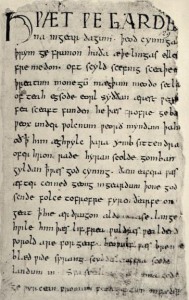Oldest English story a monstrous undertaking in Beowulf the King
Posted on April 9, 2012 By Mike Ross Front Slider, Theatre
 Consider that the oldest story ever written in (Old) English is about a terrible monster and the monster’s even more terrible monster mother, who, after wreaking much destruction and death, are defeated by a magic sword-wielding fighter who is eventually killed by a dragon.
Consider that the oldest story ever written in (Old) English is about a terrible monster and the monster’s even more terrible monster mother, who, after wreaking much destruction and death, are defeated by a magic sword-wielding fighter who is eventually killed by a dragon.
You could make a couple of conclusions:
1. Man, we’re a violent race. 2. Nerds rule!
It’s certainly no surprise that Beowulf, the story in question, written in the year 800 or so, has been told so many times and in so many ways – feature films, comic books, puppet shows, operas, you name it –setting the tone for all English fantasy fiction to follow, some would argue. Anyway, it still holds up, which is more than you can say for Battlefield Earth.
Playwright Blake William Turner has cooked up yet a new adaptation of the bloodthirsty tale, Beowulf the King, that he calls “an action movie for the stage.” Boasting at least 40 minutes of full-on stage fighting complete with off-stage foley artists simulating skull-crushing blows with lead pipes on wood and such, the world premiere of the show plays through April 29 at La Cite Francophone.
“It started out as an exploration of stage combat,” Turner says. “My goal as a director was to create a show where the storyline was inseparable from the fighting, where entire scenes would just be fighting and how that would influence a stage play, and styles of fighting and how those can influence character.”
 Beowulf was perfect. Blake’s play is a “monstrous undertaking,” he says, that hit a bump when an animated feature came out just after he’d finished his first draft in 2006, and is always evolving. Actually, he says he’s most fascinated with – and took the greatest poetic license with – the one peaceful line out of 3,182 bloodthirsty ones in the original poem (manuscript, right), something like, “And then he ruled for 50 years in peace.” There are no other details of this so called “peace.”
Beowulf was perfect. Blake’s play is a “monstrous undertaking,” he says, that hit a bump when an animated feature came out just after he’d finished his first draft in 2006, and is always evolving. Actually, he says he’s most fascinated with – and took the greatest poetic license with – the one peaceful line out of 3,182 bloodthirsty ones in the original poem (manuscript, right), something like, “And then he ruled for 50 years in peace.” There are no other details of this so called “peace.”
Turner says, “I wanted to know what would make the world’s most famous warrior want to rule in peace for 50 years. That was a strange section in the poem, so I’m getting creative with the story. I’ve definitely completely made up passages, but every single one of them could’ve been in the poem.”
He’s read seven different translations, seen innumerable adaptations, says of the 2007 feature that “Angelina Jolie coming in as a sexpot just kind of ruined for me” and claims he reads The Lord of the Rings once a year – so Turner’s credentials appear to be in order here. The Vancouver playwright (who went to school in Edmonton) is a serious student of the Dark Ages, where magic and mystery held sway and “nobody wrote anything down.” Turner also fancies the story of Alfred the Great (according to a monk who got around to writing it down), king of the Anglo-Saxons round about the mid-800s who was once trapped in a swamp surrounded by enemy armies. If he hadn’t escaped, there would be no English. We’d all be speaking Danish.
Like the battles scenes being a lot more fun when nobody gets hurt, Turner says he loves to visit the distant past in fiction. He just wouldn’t want to live there.
“It sounded like it would be a hard life,” he says, “everything about fighting or killing, every man for himself and no one made any long term plans until the Christians came along.”
Then again, the media of the time, as now, probably focused on the most interesting parts of the story told around the fire at the old mead hall, giving the “and then he ruled for 50 years in peace” part short shrift. Figures.











